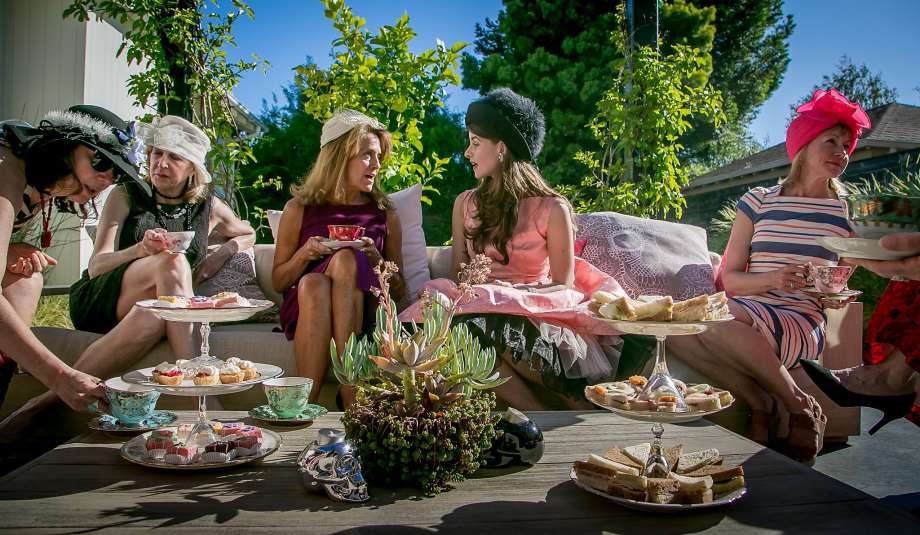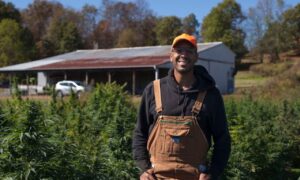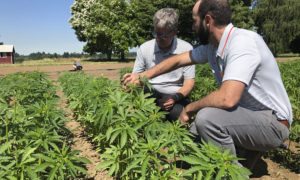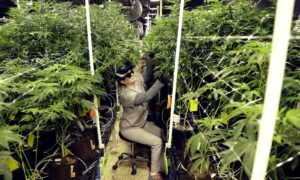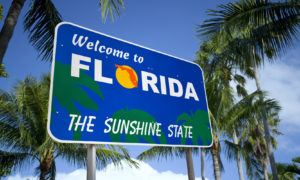“Pick a teacup that speaks to you,” said Chelsey McKrill, pointing to a table filled with boldly patterned antique teacups and saucers in every color of the rainbow.
Last month, about three dozen women met for a high tea in the backyard of a private home in downtown Mill Valley. This high tea, however, had nothing to do with altitude or a clever nod to British tradition, though there were trays of elegant finger sandwiches and raised pinky fingers.
Instead, it was one of a small handful of parties that Kikoko, a newly launched line of cannabis-infused organic teas, has hosted in the Bay Area in recent months. With its micro-dosed products — specifically targeted to appeal to the female sensibility by offering help with issues related to insomnia, loss of libido and pain relief — the company hopes to expand its customer base one cup at a time.
McKrill, 28, who leads business development at Kikoko, held court in a cocktail dress, heels and vintage hat. In general, the group was white and middle-aged, an equal mix of professional women and affluent homemakers wearing fancy hats that Kikoko organizers allowed guests to borrow for the night.
For decades, mothers have relied on an arsenal of standbys to help take the edge off. Whether it’s a relatively innocuous afternoon cocktail, or more serious stuff, like Xanax, Valium or sleeping pills, “mother’s little helpers” are commonly seen as socially acceptable crutches, often enjoyed in the company of friends.
In Northern California, enter cannabis. Kikoko is one of the latest contenders in a rapidly expanding marketplace of sleekly branded, explicitly dosed, sustainably sourced products aimed expressly at women. Here in Marin, some mothers with young children are becoming regular users — and on some nights, replacing their nightly cocktail with a cup of tea.
“We’re conscientious about the education,” said McKrill, who cut her teeth at another cannabis startup before joining Kikoko. “We really want people to have a good experience.” She asked questions of both new and experienced cannabis users to help dose each partygoer appropriately, providing them with plentiful access to hot water and one of three tea sachets: Sympa-Tea, Sensuali-Tea and Positivi-Tea.
Sympa-Tea is Kikoko’s entry point and recommendation for those who aren’t regular cannabis users. It contains 3 mg of THC, the psychoactive component in cannabis, and 20 mg of CBD, a nonpsychoactive, pain-reducing component. Sensuali-Tea (with 7 mg of THC) promises to “get you moderately high,” while Positivi-Tea (with 10 mg of THC and 5 mg of CBD) contains what many predict will become the legal-dose limit of THC in most states, including California. A fourth option, Tranquili-Tea, promises sleepiness and relaxation.
Other than at Bay Area invitation-only parties, the teas can be bought at some local dispensaries and are sold online, but only in California. (A can of 10 tea sachets costs $40 to $56.)
“Start low and go slow” was the evening’s mantra, although some attendees found that when paired with a glass or two of wine, the combination proved far more potent than anticipated. McKrill politely suggested that guests wait an hour before going back for a second cup. The Paperless Post invitation reminded guests to bring their medical marijuana ID cards (a state requirement until the end of 2017) — and also suggested the use of Uber or Lyft.
Still, what happens in Marin stays in Marin. Despite changing laws related to medical and recreational cannabis use, many partygoers were uncomfortable providing their full names for fear of being stigmatized — or worse, the possibility that their children might be denied playdates. (The host had ushered her children and husband out for the night.)
Catherine, 48, one partygoer, fits squarely in Kikoko’s target demographic. She has two children and lives in Sausalito, where she works as an executive assistant. Five years ago, she started using edibles for help with persistent insomnia, hoping to wean herself from regular use of Ativan and Ambien. She first heard of Kikoko at a local dog park and decided it was worth a try.
Now, when she walks in the door from work, rather than pouring herself a glass of wine, she brews a cup of Sympa-Tea. “My children don’t know what I’m doing. I’m just having a tea,” said Catherine, a native of France. “It’s something you can definitely do every night.”
Forty-five minutes and 3 mg of THC later, Catherine reported feeling calm and slightly slowed down —in a good way, she said. And rather than edibles, which leave an unmistakable smell on her breath that her children have detected, the tea has no discernible odor. “My aim isn’t to be stoned,” she said. “It’s to sleep well.”
The idea for Kikoko started at Stinson Beach. For 20 years, a group of about a dozen women has met for a weekend every September — seeing each other through babies and marriage, divorce and illness. Jennifer Chapin and Amanda Jones, Kikoko’s founders, started the company after watching one of their friends, Jan Parker, battle and later die from late-stage ovarian cancer.
To alleviate nausea and boost her appetite, Parker experimented with edibles but complained of imprecise dosing and hard-to-predict side effects. During their Stinson Beach weekends, the women baked pot brownies and consequently felt less anxious, slept well and laughed a lot. Three years ago, Parker planted the seed for an organic, cannabis tea with no calories or fat.
Chapin and Jones, both 54, decided to run with the idea. Chapin, a serial entrepreneur who lives in Sausalito, and Jones, a travel writer who lives in the San Mateo County enclave of Emerald Hills, already knew they had good chemistry, having previously co-founded a nonprofit that helps Congolese women through law school.
Still, cannabis veterans cautioned that their products, with such tiny dosages, would be laughed out of dispensaries.
In 2015, the two women self-funded Kikoko and didn’t take salaries for the first year and a half. Under their holding company, Stinson Brands Inc., they’ve now raised $1.3 million, with the tea manufactured in the East Bay and a dozen employees (including a female grower based in Humboldt County) now on the payroll.
“So, why the hell did two middle-aged women get into the weed business?” asked Jones during a 15- minute presentation about the health benefits of cannabis at the high tea. “We found that we’ve hit a real sweet spot. These parties are a great way to bring people together, let your hair down and not be so serious.”
Chapin and Jones are hardly alone among experienced, professional women trying their hand at second (or third) careers in the cannabis industry. Women Grow, a national network for female cannabis entrepreneurs that started in 2014, counts more than 500 members across 20 states. Gia Morón, director of communications at Women Grow, sees many career-changers in their 40s, 50s and 60s entering the industry, often with micro-dose product lines, whether beverages, edibles or topical creams.
Troy Dayton, chief executive and a co-founder of the Arcview Group, an Oakland investment and market research firm that focuses on the cannabis industry, said that last year’s North America market for recreational and medicinal marijuana hit $6.7 billion. By 2021, he predicts it will reach $22.8 billion.
“It’s unheard of to see those kinds of growth rates,” Dayton said. “Every decade or so, we see an industry with that type of growth rate. This is the current decade’s version of it.”
Dayton predicts an explosion of new products, with women leading the “huge renaissance in both the types of products and the types of consumers those products are geared toward.”
Lalita Khosla, 52, moved from New York City to San Anselmo earlier this year, following the legalization of recreational marijuana in California. Khosla is the founder of Bad Mommy Edibles, a line of dark-chocolate, micro-dose edibles.
“Bad Mommy gives mothers permission to decompress through a more mindful way than with alcohol or prescription medication,” Khosla said.
Like Kikoko, she posits her product as a healthier alternative to traditional pharmaceuticals.
“There’s a crisis in momdom, where we hold ourselves to a ridiculous standard — and too often reach for the wrong things,” said Khosla, who has a 10-year-old son. “Low-dosage cannabis edibles are a much healthier and natural way to decompress.”
Though her product is still in the research and development stage, Khosla is soliciting customer feedback and considering various distribution channels.
“The current dispensary market is run by old-school stoners,” Khosla said. “Unfortunately, it’s a boys’ club, like everywhere else. Those are the guys who want 1,000 mg of THC in one chocolate bar. The reality is that oftentimes they’re completely disconnected from the mass-market, more mainstream customer looking to simply take the edge off — not become totally catatonic.”
Back at the high tea, partygoers alternated between sips of wine and tea, as the THC slowly worked its magic.
Katie, a Mill Valley mother of two (who also declined to give her last name), described herself as an “average marijuana user,” typically using edibles 10 to 15 times each year.
Hoping to expand their customer base to include more women, some cannabis companies are experimenting with products that ease discomfort related to menstruation, menopause and migraines. Better still if they can claim to help in the bedroom.
Since trying out Kikoko’s Sensuali-Tea a few weeks ago, Katie reported that she and her partner have experienced “super-amplified orgasms.” With 7 mg of THC per cup, Kikoko’s website advertises the product as its libido-boosting tea that “intensifies the big O.”
“When you smoke it, the high is so acute and so quick. This has a nice, gentle flow to it,” said Katie, who plans on drinking the fuchsia-hued tea once a week (and ideally, with her partner in close proximity). “I don’t want to live without it,” she said, with flushed cheeks and a knowing wink.
Link – Greenstate

